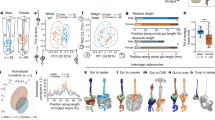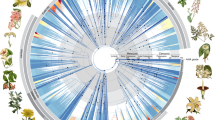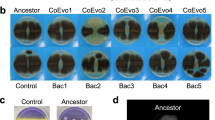Abstract
CARNIVORY in higher plants fascinated Darwin1 and later students of evolution, yet a century-long debate2 on the extent of Drosera's dependence on, and specialization for, insect prey remains inconclusive. A technique for obtaining axenic D. intermedia (a sundew) is reported here—a step forward in analysing its biochemical capabilities.
This is a preview of subscription content, access via your institution
Access options
Subscribe to this journal
Receive 51 print issues and online access
$199.00 per year
only $3.90 per issue
Buy this article
- Purchase on Springer Link
- Instant access to full article PDF
Prices may be subject to local taxes which are calculated during checkout
Similar content being viewed by others
References
Darwin, C., Insectivorous Plants (D. Appfeton and Co., New York, 1897).
Schmucker, T., and Linnemann, G., in Rhuland, W., Handbuch der Pflanzenphysiologie, 11, 198 (Springer-Verlag, Berlin, 1959).
Büsgen, M., Bot. Zeitung, 41, 569, 585 (1883).
Hutner, S. H., Baker, H., Aaronson, S., Nathan, H. A., Rodriguez, E., Lockwood, S., Sanders, M., and Petersen, R. A., J. Protozool., 4, 269 (1957).
Crocker, W., and Barton, L. V., Physiology of Seeds (Chronica Botanica. Waltham. Massachusetts, 1957).
Author information
Authors and Affiliations
Rights and permissions
About this article
Cite this article
BURGER, R. Axenic Seedlings of Drosera. Nature 191, 724–725 (1961). https://doi.org/10.1038/191724b0
Issue Date:
DOI: https://doi.org/10.1038/191724b0
This article is cited by
-
Rapid in vitro multiplication of Drosera indica L.: a vulnerable, medicinally important insectivorous plant
Plant Biotechnology Reports (2007)
-
F�rderung der Entwicklung und des Bl�hens von Pinguicula Lusitanica Durch F�tterung in Axenischer Kultur
Planta (1967)
-
Absolute reinkulturen von insektivoren
Die Naturwissenschaften (1963)
Comments
By submitting a comment you agree to abide by our Terms and Community Guidelines. If you find something abusive or that does not comply with our terms or guidelines please flag it as inappropriate.



